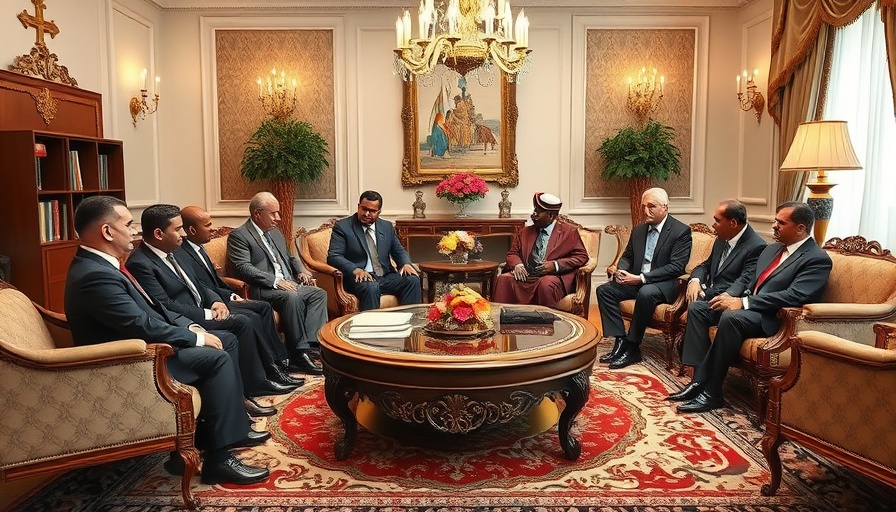
The Historic Meeting: Trump and Al-Sharaa's Unlikely Alliance
On May 14, 2025, a meeting of unprecedented significance occurred in Riyadh, Saudi Arabia, as U.S. President Donald Trump shared tea with Syrian President Ahmad al-Sharaa, a figure who once commanded a $10 million bounty on his head for terrorist activities. This meeting not only marks the first direct talks between a U.S. president and a Syrian leader in a quarter of a century but also heralds a new chapter in the geopolitics of the Middle East.
From Jihadist to President: Al-Sharaa's Transformation
Ahmad al-Sharaa, previously known as Abu Mohammed al-Jolani, led a swift military campaign that dismantled the Assad regime, which had dominated Syria for over fifty years. Once viewed as a jihadist militant with deep ties to al-Qaeda's affiliate in Syria, his transition to the presidency symbolizes a radical shift in both his personal narrative and for the Syrian state as a whole. This evolution illuminates complex layers of the Syrian conflict and the broader Middle Eastern landscape.
Global Response to Trump's Sanction Reversal
In a controversial decision, Trump announced the lifting of longstanding U.S. sanctions on Syria just a day before his meeting with al-Sharaa. This move, which received a robust standing ovation from Saudi Crown Prince Mohammed bin Salman, reflects a potential pivot in U.S. foreign policy towards a country long regarded as a pariah. Observers of global news updates might see this as a calculated bet by Trump to stabilize the Middle East by endorsing an emerging ruler who could aesthetically reposition Syria back into the orbit of Gulf investments and economic revival.
The Economic Implications for Syria
The lifting of sanctions is more than political; it opens the door for Gulf states eager to invest in Syria, which has faced crippling poverty and economic collapse since the civil war. The World Bank reports dire conditions, with the country's economy shrinking by more than half since 2010 and poverty affecting nearly 69% of the population. With an investment landscape emerging from the shadows of U.S. restrictions, billions of dollars might soon flow into Syria, reshaping its crashing economy.
Contrasting Perspectives on Al-Sharaa's Leadership
Despite the optimism surrounding potential investments, many remain skeptical. Critics argue that al-Sharaa's rise could further complicate the security dynamics of the region. While he has rebranded himself as a peacemaker, his past as a figurehead of al-Qaeda raises profound questions about the future of governance in Syria. Will he sustain a government that can maintain stability and manage the diversely fractured state? The response to this leadership from regional players will be critical, especially amidst ongoing tensions with Iran and its proxies.
What Does This Mean for U.S. Foreign Policy?
Trump's meeting with al-Sharaa raises paramount questions about the future of U.S. involvement in the region. With Trump suggesting a return to a more transactional approach, the implications for counter-terrorism policies are significant. For years, the Syrian narrative has predominantly featured U.S. interventions against jihadist groups, but this turn may indicate an acceptance of leaders with controversial pasts as long as they align with American interests.
A Historical Context: The Evolution of U.S. Involvement in Syria
This meeting represents a broader historical trend regarding U.S. intervention in Middle Eastern conflicts. From the days of supporting Assad to combat jihadism to re-evaluating alliances with perceived terrorists turned leaders, the fluid dynamics of this geopolitical theater are evident. As the U.S. continues to negotiate its position, understanding past interventions is essential for mapping future actions.
The Road Ahead: Uncertain but Potentially Transformative
In conclusion, while this historic meeting signals a possible thawing of relations between the U.S. and Syria, the road ahead remains fraught with complexities. Trump's strategic decisions regarding sanctions, economic recovery, and potential new alliances could reshape not only Syria but the entire Middle East. As a customer of legal and global affairs, staying informed through daily news digests and breaking news updates is essential in navigating this transformative period.
With ongoing discussions about Syria’s future, the significance of this meeting extends beyond the realm of immediate politics; it could fundamentally adjust the balance of power and influence across the region.
 Add Row
Add Row  Add
Add 




Write A Comment